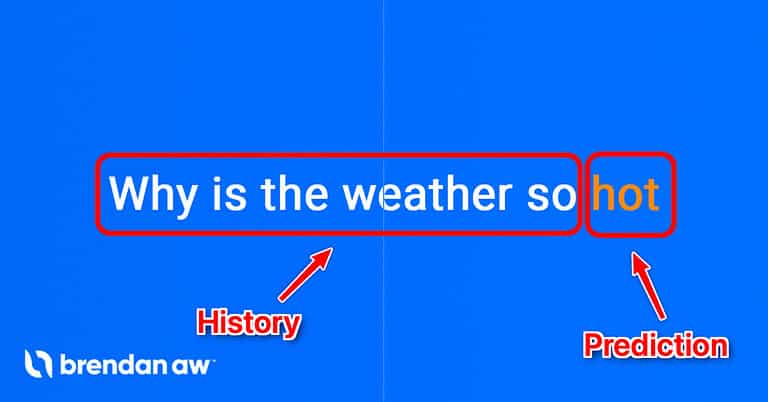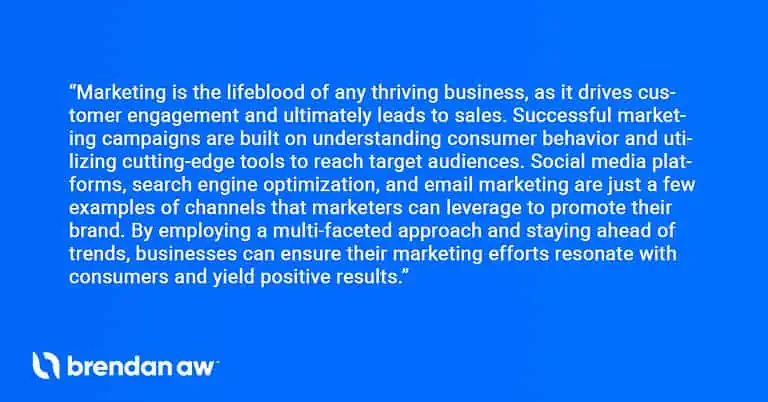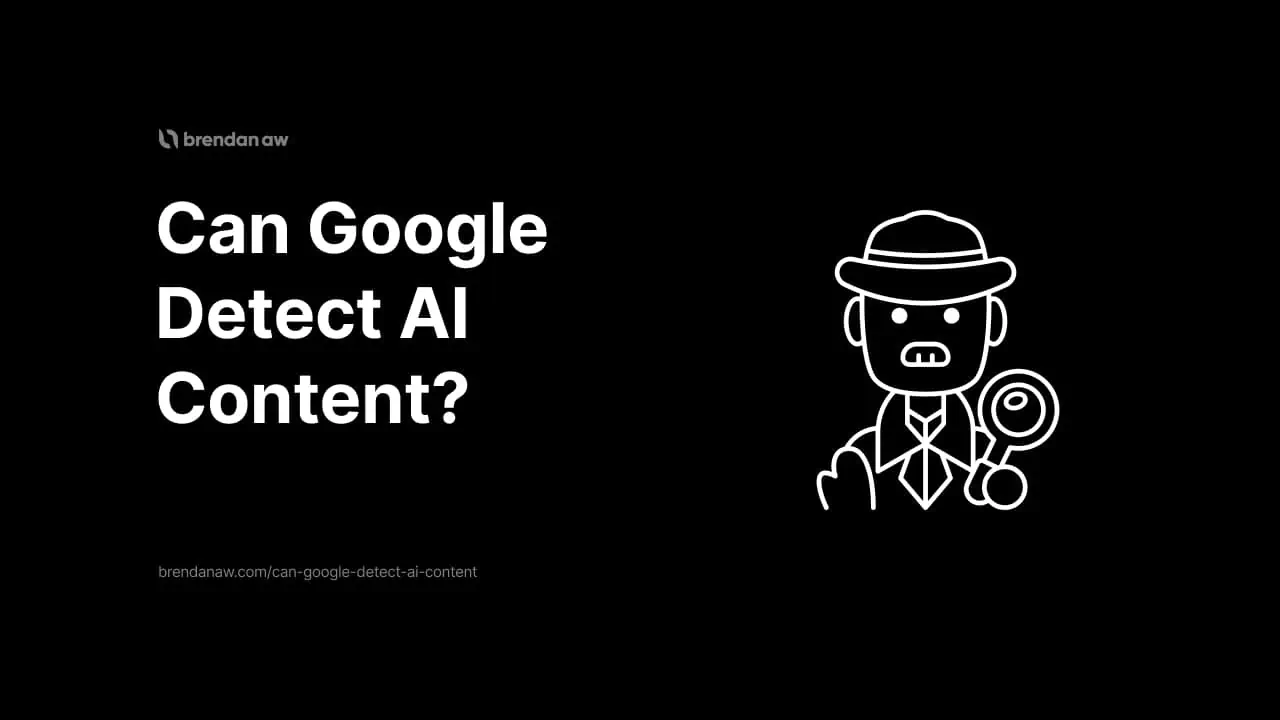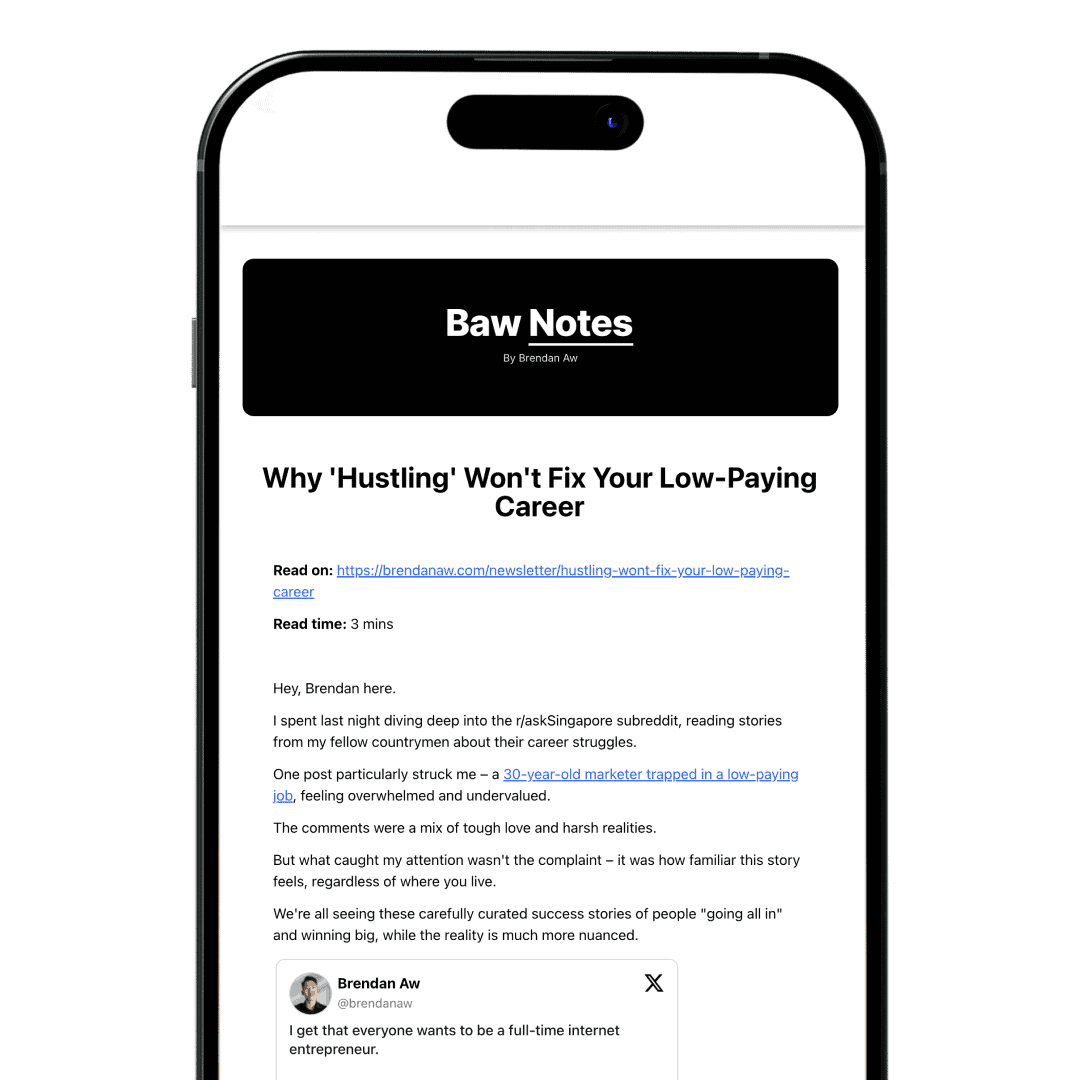Not Subscribed?
A weekly letter for solopreneurs building one-person businesses—using automation, systems, and smart workflows to grow without teams, burnout, or bloat.
Share this article
With the help of Google’s Webmaster Guidelines, we know that automatically generated content is a no-no.
But when Google announced its new update in 2022, it seemed to have changed its mind.
This has been a trending topic in the SEO community. And the buzz surrounding it still hasn’t died down.
However, it is still unclear how Google’s algorithms would detect AI content or if it’s even possible.
So can Google detect AI content?
Yes, but it’s not so clear-cut.
Let’s dive deeper.
What Is AI-Generated Content?
Before we delve in, let’s first look at what AI content actually is.
AI content is any deliverable created using artificial intelligence (AI) technology.
These little robots take in your initial input and create something similar to its training data set.
Some examples of AI content are the following:
- Text: Blog posts, social media captions, product descriptions, stories, and scripts.
- Visual Media: Photos, videos, and infographics.
- Audio: Music, voiceovers, narrations, and sound effects.
They can also do coding, machine translation, fact-checking, and help with stock market predictions.
Their ability to produce all these things with just a few clicks makes it so powerful and a little scary.
No wonder this technology is buzzing, especially in the content marketing and SEO communities. Imagine writing long-form articles and web copy in just seconds.
Therefore, knowing how to detect AI-generated content might also be a good idea.
You might think that would be a dream come true for content marketers.
That’s what I thought too.
But Google frowns upon auto-generated content, and you’ll see why.
After trying several AI writing tools, I can say that sometimes it’s hard to tell whether humans or AI wrote the content.
But can Google detect AI-generated content, and will they penalize you?
Here’s what I know so far:
So Can Google Detect AI Written Content?
My answer is YES. Google can detect AI content.
It’s debatable, but let me explain.
In this interview with John Mueller, Chaubey specifically asks if Google understands the difference between human content and human content.
Mueller said, “I cannot prove it.“
Though Mueller can’t give a definitive claim that Google can, in fact, automatically detect content generated by AI.
But he did say that if it all falls under spammy automatically-generated content, the web spam team will flag it as spam and potentially penalize it if they come across it.
Their answer is not definitive, so it is more of a “read between the lines” situation.
But the takeaway from this video is that it’s more of a cat-and-mouse game.
So why do I still think Google can detect AI-generated content?
Let me ask you one simple question.
If AI detection tools can already do it, what makes you think Google can’t?
It sounds like what he’s saying is, “We can detect AI content, but I’m not going to disclose how because you are just going to find another way to game the system rather than taking a user-first approach.“
How Does Google Detect AI Content?
Let me first explain how AI-generated content is created.
That’s done via Natural Language Generation (NLG) which is using numerical information and formulas to extract patterns from a dataset and turning it into text that we both can understand.
Basically, AI algorithms learn from a large collection of text (corpus) and create text that’s similar to what they’ve learned.

Now, Google has these smart machine-learning techniques that can figure out if a piece of text is AI-generated by essentially performing the reverse.
The algorithms then try to spot patterns that show it’s not really written by a person.
Let’s take this example:

So, Google might think this is AI-generated for the following reasons:
- Perplexity: AI-generated text often has lower perplexity, meaning it’s more predictable and formulaic than human-written content. This can make the text seem TOO perfect.
- Burstiness: It also can exhibit “burstiness,” or the repeated use of certain words or phrases in a short span. In this example, the words “marketing” and “consumer” are used frequently.
- Grammar: Although the grammar is technically correct, it lacks the natural variation and imperfections that are typically found in human writing.
- Syntax: The syntax is accurate, but the sentences may feel somewhat stiff and over-structured.
- Lack of Depth or Specificity: The text provides a general overview of marketing without delving into specific examples or offering unique insights.
- Overuse of Qualifiers and Adjectives: It tries to be fancy and uses an excessive number of qualifiers or adjectives in an attempt to make the text sound more persuasive or authoritative.
And you know what’s interesting?
Most AI writing tools just spit out huge chunks of text that are just a pain in the arse to read.
Google might downgrade that kind of content, not because it’s AI-generated, but because it’s just not good quality and doesn’t give readers a great experience.
Why do you think I write in short sentences?
How To Avoid AI Detection by Google
Here are some tips to follow if you want to avoid AI detection by Google:
- Use an AI Humanizer or Paraphraser
- Make It Feel Like a Human Being Wrote It
- Check if the Content Is Accurate
- Offer Unique Value
- Use an AI Writing Tool That Has Multiple Language Models
- Prioritize Human Readers
- Follow Google’s E-E-A-T Guidelines
1. Use an AI Humanizer or Paraphraser
This is a paid method, but it’s also the easiest and fastest.
You can use a tool like Undetectable AI.
It rewrites the AI-generated content and makes it avoid detection with just one click.
The best part?
You can select various readability and purpose options while keeping the original text’s nuances.
It’s also highly affordable and unlike the overpriced garbage online.
And if you’re not satisfied?
You get a full refund. No questions asked.
2. Make It Feel Like a Human Being Wrote It
An AI-generated text lacks personality and creativity. It also sounds too robotic.
Have you ever come across content that sounds monotonous and emotionless? Most content written by AI sounds exactly like that.
It isn’t interesting to read, and you’re more likely to skip it, right?
So try to add your personality to the text to make it sound more like you. Make your audience feel like they are talking to YOU.
You’ll publish the content under your name, after all.
Remember that paraphrasing and translation tricks will not make your text sound more human. What you are doing is just shuffling words around.
Google is smart. You know that.
3. Check if the Content Is Accurate
Any information generated programmatically isn’t accurate. This is one of the major drawbacks of AI.
You still need to put in much work by researching and fact-checking. Your credibility and trustworthiness will be at risk if your content contains wrong information.
4. Offer Unique Value
After readers review your content, will they leave like they’ve learned something new?
Adding sufficient value to your content is what makes a reader come back again and again.
And this is what Google is asking from you.
Remember that Google will not flag content as long as it offers value to the readers.
5. Use an AI Writing Tool That Has Multiple Language Models
Most of the latest AI writing tools rely on readily available language models APIs like OpenAI’s GPT-4, GPT-4o, GPT-4.1, and ChatGPT.
This makes it easier to identify specific markers from their content output.
You want to use tools that use a mix of different NLP algorithms, so there’s a more significant variance in the text and, thus, harder to detect.
I conducted a few tests to see the best way to make AI content undetectable. Have a read if you want to know more.
6. Prioritize Human Readers
It may feel like Google is playing with you with these changes and vague statements. But one thing is sure.
Their primary purpose will always be to provide users with the most relevant and highest-quality results.
They may change their mind about other things, but this is set in stone.
AI-generated content isn’t inherently bad.
But if you use AI writing tools to generate content purely to boost rankings on the search results and not for human readers, you might be doing more harm than good.
Search engines like Google were made for humans, not machines.
Going back to the basics and following best practices for creating content is still the best strategy in this SEO game.
This way, you won’t run around trying to find loopholes after every update to stay relevant.
And you won’t worry about your content getting flagged as spam.
7. Follow Google’s E-E-A-T Guidelines
Google’s E-E-A-T stands for Experience, Expertise, Authoritativeness, and Trustworthiness. E-E-A-T is a guideline that Google uses to determine whether the web content is valuable to the readers.
Formerly called E-A-T guidelines in 2018, Google recently added a new letter for ‘Experience’. So if you want to create content that offers value and to avoid being penalized, follow this guideline.
Experience
As a writer or content creator, Google wants you to have at least some background about the content you are writing.
Whether it is firsthand experience or you are sharing a story from someone else.
For example:
If you are writing a product review, you should have tried the product you are writing about at least once.
Expertise
You must have knowledge or skill about the topic you are working on.
People are more likely to trust the health advice of someone with a medical background than that of a casual blogger.
Authoritativeness
Your content should be authoritative and a credible source of relevant information.
This means building a topical map around all the subjects you cover.
Don’t forget that Google can’t “read” the content on your website but crawls it for information and makes connections through entities.
Trustworthiness
Google wants you to build trust among your readers and establish a reputable site.
You can do this by offering reliable information and proving that your business is legitimate by having the following:
- Telephone number
- Multiple department email addresses
- A Google business profile
- About us and team pages
- A registered local address
Can Google Detect AI Content? (FAQs)
How Does Google Detect AI Content?
Google detects AI-generated content by using machine learning algorithms. These algorithms analyze signals such as text structure, grammar, and syntax to identify patterns indicative of AI-generated text.
This is my general opinion, and it has not been officially confirmed.
How Will Google Penalize Web Pages That Use Spammy AI Content?
If your content falls under their guidelines, the webspam team will impose a manual penalty. What those actions are is still unclear. But it will mess up your search rankings, that’s for sure.
Can Google Detect Chat GPT Content
I believe Google can detect ChatGPT content if they want to by creating a detection system. However, there is currently no concrete evidence that they have one.
John Mueller never claimed that their systems could automatically detect content written by ChatGPT or any other tool.
Some experts believe that Google can detect unnatural language patterns generated by ChatGPT, which will be seen as spammy content.
Can AI Content Be Detected?
Yes, AI content can be detected. AI detection tools like Originality AI and Winston AI can detect AI content with scary accuracy. These are not 100% accurate, but they can help you better understand whether your material is at risk of being flagged as AI-written content.
Why Would I Want To Avoid Google Detection?
You’ll want to avoid Google detection because if your content is flagged as spam, it can affect your search rankings, and your hard work will go to waste.
Why Doesn’t Google Search Ban AI Content?
Google Search doesn’t ban AI content because it wouldn’t make sense when every company, including Google themselves, potentially uses AI to provide useful content to others. And according to them, AI-generated content is fine as long as it’s not used primarily to manipulate search rankings.
To Sum Up
The bottom line here is that you should not solely rely on AI.
You will always be more creative and better at producing unique content than any other AI tool.
The foolproof way to avoid getting penalized by Google is to search keywords that prioritize your readers.
This means taking a user-first approach and not creating content for the sole purpose of ranking.
Google may not be able to detect AI content now automatically.
But their algorithms are constantly improving and preparing for a future with AI.
So things may very well change…
Bypassing AI detection in the meantime won’t hurt.
I hope this blog post answered your questions and cleared out some misconceptions.
Like this article?
[wp_ulike for=”post” style=”wp-ulike-pin”]Share this article

About the author
Hi, I’m Brendan Aw. A creator, GTM engineer, and digital entrepreneur obsessed with building lean businesses from home. Professionally, I’ve led marketing for 7–8 figure startups in e-commerce, fintech, e-sports, retail, agencies and Web3. I hold a B.Com in Accounting & Finance from UNSW and a Data Science certification from Le Wagon. Now, I document my entrepreneurship journey online for myself and others.
Here are more resources for you:
- Read Baw Notes: My weekly letter for those building lean, or one-person businesses using systems, automation, and digital leverage.
- Read my blog: Explore tactical guides on automation, systems, monetization, growth, and solo strategy.
- Use my online business tool stack: Discover the exact tools I use to run my businesses.
Not Subscribed?
A weekly letter for those building lean and one-person digital-first businesses.
Avoid all AI detection with just a click of a button.

